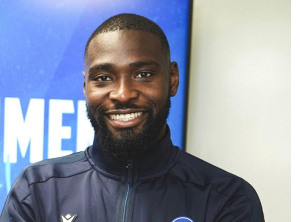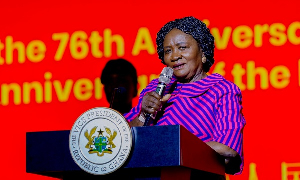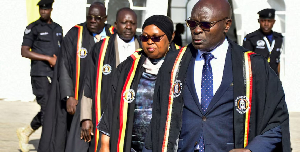Accra, Nov. 6, GNA - Journalists and media propagandists have been warned that they could be indicted and prosecuted under International law when they use their media to promote ethnic and tribal hatred.
Mr. Elvis Bazawule, Trial Attorney, International Criminal Tribunal for Rwanda (ICTR) who gave the advice said journalists, who used their media to incite hatred, could not be shielded from prosecution on the grounds of freedom of expression.
Mr. Bazawule was speaking on the topic: "Criminal Responsibility of Journalists under International Law: Lessons and Insights from the ICTR- Media Trial" at a Media Dialogue organised by the Ghana Journalists Association on the theme: "Never take the Peace for Granted.
He said, while press freedom was guaranteed in the 1992 constitution, the exercise of such freedom by journalists did not exempt them and other media propagandists from individual criminal responsibility for using their media to sow seeds of tribalism and ethnocentrism.
Besides, the International Human Rights Law also imposes restrictions on the exercise of freedom of expression, especially restrictions that include prohibition to disseminate hate speech or incitement.
From the foregoing, Mr Bazawule, stressed that journalists and other propagandists could not run away from justice for violations of any of the crimes stipulated in the articles of the ICTR statute. The two-hour lecture traced the history of the Rwanda conflict and the role the incitement of the media, which led to estimated killings of 800,000 Tutsis and moderate Hutus within 100 days. He urged the Ghanaian media to take lessons from the Rwanda situation and to ensure at all times that they maintain sensitivity and balance so as not to inflame passion when reporting on conflict situations.
Mr Bazawule said it was the responsibility of journalists to build channels of communications between parties involved in conflicts through their publications.
'The role of the media is crucial in conflict areas because journalists are uniquely capable of peace building and promotion which they do through consensus building as well as solution building suggestions in the discharge of their mandated duties,' he said. This could only be done well when journalists respect the laws governing their profession and adhere to a very high moral and ethical standard in order not to be vehicle of evil.
He tasked the Ghanaian journalists to be committed and determined not to allow the media to be used for evil but as a vehicle to build a peaceful and dynamic society.
The nation building role of the media is more demanding in nascent democracies and in conflict prone areas, he said.
Mr Bazawule asked the journalists to strive for good governance, improvement in the economy and protection of human rights while ensuring that their commentaries on national issues and individuals were objective and fair.
Professor Henrietta Mensa-Bonsu, Vice Dean, Faculty of Law, University of Ghana said history was replete with conflicts that arose from the messages that were churned out by the media ordering society to take a certain cause of action.
She warned that there were traces of such 91ordering' in the Ghanaian media and every attempt should be made to prevent it so as not to retard the development and progress the country was making.
General News of Monday, 6 November 2006
Source: GNA













